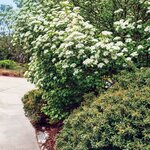

In a high-technology world, home gardening can be decidedly lowtech.
Basic tools – shovels, trowels, watering cans and more – have been used for eons. They do not require a computer, specialized training or Internet access!
It is possible to cultivate plants using time-honored techniques. Mulching, for instance, naturally occurs in forests as leaves drop and decompose.
A mulch is simply a layer of organic or inorganic material covering the soil surface. In home landscapes, mulching typically involves adding a few inches of compost, rock, bark or wood chips atop the dirt.
Sound simple? It is.
However, mulching is a “high-impact” garden practice, which means that you will reap benefits. In hot, dry locales, the primary benefit of mulching is water conservation, but it has other uses.
According to Texas A&M University horticulturists, plants that have the soil atop their root systems top dressed by a 1-inch layer of mulch will use 25 percent less water than plants with no mulch. Covering the surface reduces evaporation at the surface.
Mulch also helps to keep root systems cool, which in turn minimizes evaporation deep in the soil, reducing the amount and frequency of moisture needed.
Also, using mulch to top dress soil benefits plants because it slows and spreads water penetration, allowing it more time to reach the entire root zone before the top layer becomes dry. Consistent moisture and a cool root zone reduces plant stress during hot weather.
For maximum water conservation, add mulch in late winter to early spring when rainfall tends to be more abundant. Mulch will hold moisture at the root level where plants need it most. Replenish mulch as needed in late summer to insulate plant roots.
To allow oxygen/carbon dioxide transfer and water penetration, do not apply mulch more than 6 inches deep, keeping mulch away from the base of trees and shrubs.
Inorganic mulches are often used as decorative landscape cover or to deter weeds. Organic mulches, on the other hand, have advantages related to plant health. As organic mulch decomposes, it provides plants with a steady source of nutrients, thereby minimizing the need for fertilizers.
Organics also reflect less sunlight, reducing the heat loads on plants and surrounding buildings. Other benefits to this centuriesold soil building technique include:
■ Reduces soil erosion, particularly on slopes;
■ Moderates soil temperatures, keeping soil warmer in winter and cooler in summer;
■ Reduces weed seed germination and restricts weed growth;
■ Limits the spread of soilborne disease; and
■ Creates aesthetically pleasing landscape beds.
For answers to horticulture questions call the Texas AgriLife Extension, Hood County at 817-579-3280 or go online to visit lakegranburymastergardeners.org.